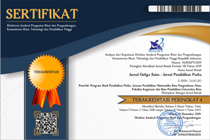Science e-Module Based on Scientific Approach Using Kvisoft Flipbook on Temperature and Heat Materials in Class VII Junior High School
Abstract
Keywords
Full Text:
PDFReferences
Abdullah, Syahbanur, R., & Roza, L. (2020). Pengembangan E-Modul Interaktif Chemistry Magazine Berbasis Kvisoft Flipbook Maker pada Materi Laju Reaksi, Jurnal Zarah, 8(1), 7-13.
Anggraini, D. P. (2019). Penerapan Media Pembelajaran Fisika Menggunakan Modul Cetak dan Modul Elektronik pada Siswa SMA. Jurnal Pendidikan Fisika, 7(1), 17-25. DOI: https://doi.org/10.24252/jpf.v7i1.7155
Dahlia, F., Poppy, Y., Supianti, I. I., & Mira, M. (2019). Pendekatan Saintifik Berbasis e-Learning untuk Meningkatkan Kemampuan Berpikir Kreatif Meatematis dan Self-Confidence. Jurnal Analisa, 5(2), 150.
David, M., & Anass, B. (2020). Determinants of Mobile Learning Acceptance for STEM Education in Rural Areas. Journal Computers & Education,160(1), 1. DOI: 10.1016/j.compedu.2020.104010
Depdiknas. (2008). Panduan Pengembangan Bahan Ajar. Jakarta: Pusat Kurikulum Balitbang Diknas.
Desi, R., Sri, W., & Yushardi. (2017). Pengembangan Media Pembelajaran Flipbook pada Materi Gerak Benda di SMP. Jurnal Pembelajaran Fisika, 6(4), 326-332. DOI: https://doi.org/10.19184/jpf.v6i4.6213
Hidayatullah, M. S. (2016). Pengembangan Media Pembelajaran Berbasis Flipbook Maker pada Mata Pelajaran Elektronika Dasar di SMKN 1 Sampang, Jurnal Pendidikan Teknik Elektro, 5(1), 83-88.
Indah S., Eko R., & Henny, J. (2019). Pengembangan Bahan Ajar Elektronik Menggunakan Flip PDF Professional pada Materi Alat-Alat Optik di SMA. Jurnal Kumparan Fisika, 2(3), 145-152.
Joanne, L., Peter, F., Giovanni, L., & Yvonne. (2020). Development and Impact Evaluation of An e-Learning Radiation Oncology Module. International Journal of Onclology, Biology, Physics, 28(3), 1.
Kemendikbud. (2014). Permendikbud Nomor 103 Tahun 2014 Tentang Pembelajaran Pada Pendidikan Dasar dan Pendidikan Menengah. Jakarta: Kementrian Pendidikan dan Kebudayaan RI.
Kemenristekdikti. (2018). Mempersiapkan SDM Indonesia di Era Revolusi 4.0. Jakarta: Kementrian Riset, Teknologi dan Pendidikan Tinggi RI.
Metriana, V. (2020). Penggunaan e-Modul Sebagai Pembelajaran Daring dalam Menunjang Minat Belajar Siswa Kelas IX. Skripsi, Universitas Pelita Harapan.
Napsawati. (2020). Analisis Situasi Pembelajaran IPA Fisika dengan Metode Daring di Tengah Wabah Covid-19. Karst: Jurnal Pendidikan Fisika dan Terapannya, 3(1), 6-12.
Nina, R. (2016). Pengembangan E-learning dengan Edmodo sebagai Suplemen Pembelajaran Fisika Materi Rangkaian Arus Searah. Skripsi, Pendidikan Fisika Universitas Lampung.
Nur Pajr, M. Hidayat & Dwi Agus Kurniawan. (2017). Pengembangan e-Modul Fisika Berbasis Pendekatan Saintifik pada Materi Rangkaian Listrik untuk Siswa SMP Kelas X. Jurnal Fisika, 1, 1-12.
Nurita, P. (2013). Cara Membuat Media Pembelajaran Online Menggunakan Edmodo. Jurnal Pendidikan Informatika dan Sains, 2( 2).
Nurul, L., Ashari, & Eko S. K. (2020). Pengembangan e-Modul Fisika untuk Meningkatkan Kemampuan Berpikir Kritis Peserta Didik. JIPS: Jurnal Inovasi Pendidikan Sains, 1(1), 1-7. DOI: https://doi.org/10.37729/jips.v1i1.570
Rebecca, C., & Jeremy. (2020). Development of An e-Learning Module to Facilitate Student Learning and Outcomes. Journal Teaching and Learning in Nursing, 8(5), 54. DOI: 10.1016/j.teln.2020.10.007
Riduwan. (2015). Skala Pengukuran Variabel-Variabel Penelitian. Bandung: Alfabeta.
Robert, M. B. (2009). Instructional Design: The ADDIE Approach. Georgia: Springer.
Seprida, H. (2015). Pemanfaatan e-Learning Berbasis LCMS Moodle Sebagai Media Pembelajaran untuk Mata Kuliah Sistem Informasi Akuntansi. Jurnal Riset Akuntansi dan Bisnis, 15(1), 86-99.
Siti, R., Sihkabuden, & Susilaningsih. (2018). Penerapan Pendekatan Saintifik pada Mata Pelajaran IPA di MTs Putri Nurul Masyithoh Lumajang. Jurnal KTP, 1(3), 205-212.
Sufairoh. (2016). Pendekatan Saintifik dan Model Pembelajaran K-13. Jurnal Pendidikan Profesional, 5(3), 116-125.
Sukendro, Akhmad, H., Khaeruddin, Boy, I., Syahruddin, Fredrik, A.M., & Hikmad, H. (2020). Using An Extended Technology Acceptance Model to Understand Students use of e-learning During Covid-19: Indonesian Sport Science Education Context. Journal Heliyon, 6(11), 7-8.
Wahyu, A. (2020). Dampak Covid-19 terhadap Implementasi Pembelajaran Daring di Sekolah Dasar. Jurnal Ilmu Pendidikan, 2(1), 55-61.
Zaharah, Upik, Y., & Revis, A. (2017). Pengembangan Modul Elektronik dengan Pendekatan Saintifik Materi Sistem Peredaran Darah pada Manusia untuk Siswa Kelas VIII. Jurnal Edu-Sains, 6(1), 26-27.
DOI: http://dx.doi.org/10.31258/jgs.9.1.70-80
Refbacks
- There are currently no refbacks.
Copyright (c) 2021 Alya Armani, M. Rahmad, Zulhelmi Zulhelmi

This work is licensed under a Creative Commons Attribution 4.0 International License.
Jurnal ini terdaftar dan terindeks pada:
- Crossref
- Google Scholar
- Crossref
- Garuda
- Sinta
- Researchgate
- Dimensions
- Base
- Scilit
- OneSearch
- Road
- CiteFactor
- ResearchBib
- WorldCat



















